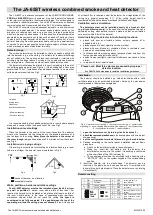
BloodTrack Kiosk® V5 Installation Guide
HAE: SM-BloodTrack-08(AA)
SBC100xxx
GBE: 2000-JNB0012
9
The IP address assigned to clients, such as the BloodTrack Courier software running on
the BloodTrack Kiosk V5, within the subnet must not be shared with another device on
the same subnet.
The healthcare site will have a policy to determine the techniques used for configuring
the network and the available pool of TCP/IP network addresses, subnets and
routers/gateways which will be available for the BloodTrack Courier software running on
the BloodTrack Kiosk V5 to use in order to communicate with the BECS.
There are four techniques to assign IP address. One is ‘static’, hereby the IP address
assigned to the BloodTrack Kiosk V5 is fixed by a manual process.
The remaining three methods use ‘Dynamic Host Configuration Protocol’ (DHCP) which
is a facility offered by a server to the BloodTrack Courier software running on the
BloodTrack Kiosk V5 which is the client. The DHCP server may be the BECS or a
supplementary device on the network such as a network router.
As the client boots a request is generated on the Local Area Network for a DHCP server
to assign it an IP address. The DHCP server has a pool of available IP addresses and
will issue one is response to the request.
The available pool of addresses available to the DHCP server can be managed in three
ways; manual allocation, automatic allocation or dynamic allocation. How this is done is
determined by the healthcare site’s policy. Manual allocation will assign the same IP
address to the client device on each boot. Automatic allocation will let the DHCP client
automatically negotiate an IP address with the server as will dynamic allocation but the
latter assigns a lease time whereby the IP address must be renegotiated once the lease
has expired.
The methods used to determine the BloodTrack Kiosk V5 network address will be set
by the Healthcare site’s policy.
Any changes to the network connection after installation (changes to
configuration/settings, connection of additional items, disconnection of the BloodTrack
Courier software running on the BloodTrack Kiosk V5 or additional items, or an
update/upgrade of equipment connected to the network connection), could introduce
new risks and would require additional analysis.
2.7.4 Network Security and Performance
The BloodTrack Courier software that operates on the BloodTrack Kiosk V5 is a client
for the Blood Establishment Computer Software System (BECS) server. Data, other
than that being cached to allow proper functioning when reporting transactions to the
server, is not retained on the BloodTrack Kiosk V5.
Any unauthorized access is restricted and controlled by the BloodTrack Courier
software, which requires the user to log on to the BloodTrack Kiosk V5 to perform an
operation at the storage
location. This logon process uses the healthcare site’s staff
identification system.
















































